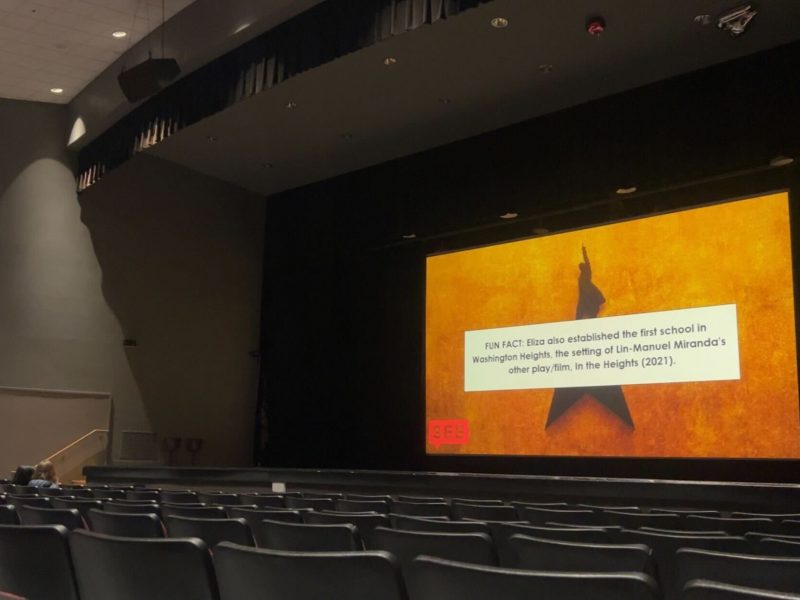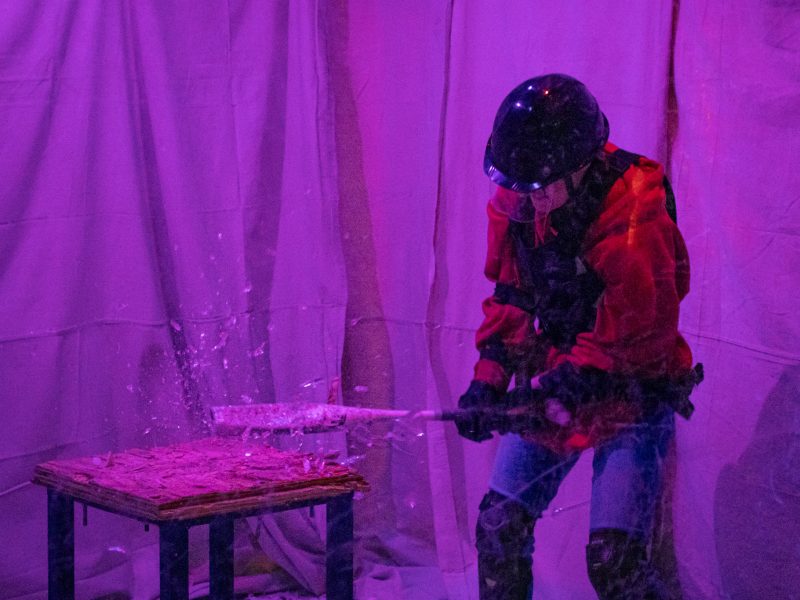This semester has been isolating for many students, to say the least. But for the competitors and producers of Big Brother Maryland, it’s been an opportunity to meet peers with whom they may have never come into contact — from a distance, of course.
The competition is based off the long-running CBS reality show Big Brother. Each week, University of Maryland students participate in two competitions: “head of household,” where one player wins the power to nominate two other students for elimination, and “power of veto,” where another player can gain the ability to veto one of those nominations, if they so choose.
The competitions test students’ mental and physical strength and endurance. They may have to stand for hours with their arms raised above their heads, or find themselves racing around the campus. Michael Wallis, the show’s founder who graduated in spring 2020, said his favorite competition was one where contestants had to melt a large ice block with their bodies to release a key, and then use that key to unlock a puzzle, which they then solved.
After the power of veto competition, players are given time to strategize before choosing someone to vote out of the game. This process continues weekly until there are two players left. At that point, the eliminated players vote for a winner, who earns a cash prize of $150.
“The jury is comprised of the people you vote out, so it’s a game about forming alliances, connections, balancing relationships, and making sure that when you do vote people out of the game, you do it in a way that they respect,” Wallis said.
Wallis founded the club last fall. He had competed in Survivor Maryland, based on another CBS reality show, Survivor, and was inspired to create his own game show for students to participate in. Now on its third season and accepting applications for the fourth, it’s clear that Big Brother Maryland has been a success.
Each season has a special theme, which makes the game more interesting, especially for fans of the show. Season one (fall 2019) was called “Double Take” — some of the players were cast in pairs, so contestants had to figure out who already had preexisting relationships. There were roommates, a couple and even a pair of exes. There was also a pair of identical twins, who were supposed to switch in and out of the game, but they were identified quickly and voted out first.
Season two (spring 2020) was called “Class Conflict.” Contestants were divided up based on their grade, and for the first two weeks they competed only within their group of nine upperclassmen or underclassmen before merging after two eliminations each.
[The Grammys can’t figure out rap and R&B, and we can’t expect them to]
This season, the theme is resurgence. One player from seasons one and two, respectively, was invited back to compete and redeem themselves. Eliminated players also have a chance to battle in competitions to return to the game.
“These twists and ideas elevate the game to make it more special for the people who are fans and the people who aren’t,” Wallis said. “It makes it less predictable. It makes it more interesting.”
Another major component of the game is the social aspect. Players are expected to meet on their own time to form alliances and strategize, making decisions about who would be best to vote out. According to Wallis, students have made both long-lasting friendships and enemies after competing.
“There’s people who still, a year later, talk shit about other players. Just how things went down, how dirty they did them,” he said. “If you are cast to play and you do want to play, it’s going to force you to work with people and relate with people that you might never have met.”
Meeting new people and working with them for weeks on end is valuable during the COVID-19 pandemic, when most on-campus activities, including classes, take place online.
“I’ve made friendships with a lot of people, like I said, that I wouldn’t have otherwise, and I’m really thankful for it,” Lexi Deifallah, a freshman music performance major and season three contestant, said. “You’ll walk into the game, and you’ll play with these people — you’ll probably lie to these people, you’ll probably try to manipulate these people — and then you’ll go get coffee afterwards.”
Wallis says the pandemic has made running the game a bit harder, especially in terms of finding new applicants, but they are taking it in stride. He said Instagram has helped the group reach out to students.
“With the First Look Fair being virtual, and other factors involved, we’ve had to look for alternative solutions to casting,” he said. “So far, we’ve followed like 4,000 UMD students on Instagram … all it takes is to click on someone’s profile, and they could apply.”
[This year, the biggest holiday season trend is ennui]
Producers have also taken precautions to keep players safe and healthy, such as bringing hand sanitizer to every event, holding events outside and having players wear masks. During challenges, every player is spread out and has their own materials, so they don’t come in close contact with one another.
Following Wallis’ graduation, Ryan Hergenreder, a junior general biology and history major who competed in season two, will be taking over as lead of the production team for season four. He already has plans for future seasons, including three “pillars of leadership” that he hopes to accomplish: building community among the production team, delegating tasks more equally and increasing health resources for players.
Season three was the first season to be filmed all the way through, and Wallis and Hergenreder hope the episodes will be available on YouTube sometime this summer.
“We’ll do the same for the next season, so if you want your screen time and minutes of Maryland fame, sign up for Big Brother,” Hergenreder said.
The production team is currently taking applications for season four, which is set to begin in February. They urge anyone who is interested to apply through their Instagram page.
“If you want an opportunity to meet people that you never would have met in college … I think this is the best opportunity,” Wallis said.
Both Hergenreder and Deifallah said they loved competing and that it was a valuable experience that students should consider being part of.
“Big Brother Maryland is probably one of the most unique and fun college experiences that anyone could ever have,” Hergenreder said. “It’s an interesting social game, it’s an interesting game in terms of the fun challenges, but also the way you meet people and the way you interact with them. It’s just phenomenal.”



